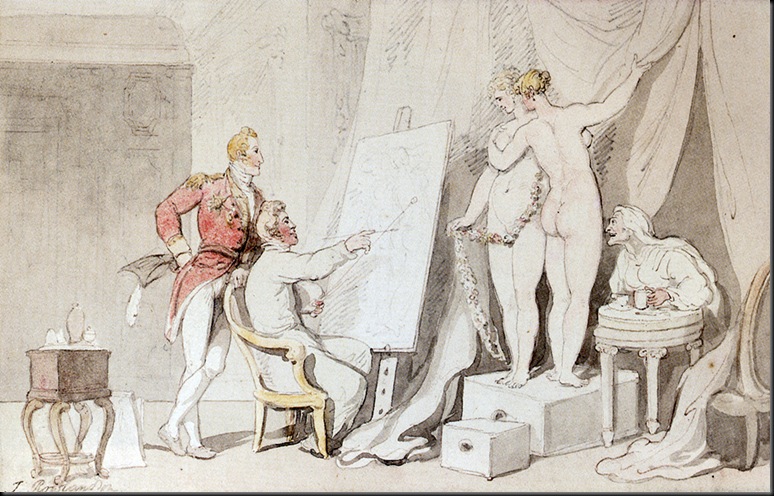Thomas Rowlandson
(13 July 1756 – 21 April 1827)
was an English artist and caricaturist.
Rowlandson was born in Old Jewry, in the City of London. His father, William, had been a weaver, but had moved into trading supplies for the textile industry and after overextending himself was declared bankrupt in 1759. Life became difficult for him in London and, in late 1759, he moved his family to Richmond, North Yorkshire. Thomas' uncle James died in 1764, and his widow Jane probably provided both the funds and accommodation which allowed Thomas to attend school in London; in 1765 or 1766 he started at the Soho Academy. There is no documentary evidence that Rowlandson took drawing classes at the mainly business-oriented school, but it seems likely, as on leaving school in 1772, he became a student at the Royal AcademyRowlandson spent six years studying at the Royal Academy, but about a third of this time was spent in Paris where he may have studied under Jean-Baptiste Pigalle. He later made frequent tours to the Continent, enriching his portfolios with numerous sketches of life and character. In 1775 he exhibited a drawing of Dalilah Payeth Sampson a Visit while in Prison at Gaza at the Royal Academy and two years later received a silver medal for a bas-relief figure. He was spoken of as a promising student; had he continued his early application he would have made his mark as a painter. On the death of his aunt, he inherited £7,000 with which he plunged into the dissipations of the town and was known to sit at the gaming-table for 36 hours at a stretch.
In time poverty overtook him; and the friendship and examples of James Gillray and Henry William Bunbury seem to have suggested caricature as a means of earning a living. His drawing of Vauxhall, shown in the Royal Academy exhibition of 1784, had been engraved by Pollard, and the print was a success. Rowlandson was largely employed by Rudolph Ackermann, the art publisher, who in 1809—issued in his Poetical Magazine The Schoolmaster’s Tour—a series of plates with illustrative verses by Dr. William Combe. They were the most popular of the artist’s works. Again engraved by Rowlandson himself in 1812, and issued under the title of the Tour of Dr Syntax in Search of the Picturesque, they had attained a fifth edition by 1813, and were followed in 1820 by Dr Syntax in Search of Consolation, and in 1821 by the Third Tour of Dr Syntax in Search of a Wife. He also produced a body of erotic prints and woodcuts.The same collaboration of designer, author and publisher appeared in the English Dance of Death,issued in 1814–16 and in the Dance of Life, 1817. Rowlandson also illustrated Smollett, Goldsmith and Sterne, and his designs will be found in The Spirit of the Public Journals (1825), The English Spy(1825), and The Humorist (1831). He died in London, after a prolonged illness, on 21 April 1827.
Rowlandson’s designs were usually done in outline with the reed-pen, and delicately washed with colour. They were then etched by the artist on the copper, and afterwards aquatinted—usually by a professional engraver, the impressions being finally coloured by hand. As a designer he was characterized by his facility and ease of draughtsmanship. He dealt less frequently with politics than his fierce contemporary, Gillray, but commonly touching, in a rather gentle spirit, the various aspects and incidents of social life. His most artistic work is to be found among the more careful drawings of his earlier period; but even among the exaggerated caricature of his later time we find hints that this master of the humorous might have attained to the beautiful had he so willed.
His work included a personification of the United Kingdom named John Bull who was developed from about 1790 in conjunction with other British satirical artists such as Gillray and George Cruikshank.



















Nessun commento:
Posta un commento